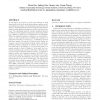Free Online Productivity Tools
i2Speak
i2Symbol
i2OCR
iTex2Img
iWeb2Print
iWeb2Shot
i2Type
iPdf2Split
iPdf2Merge
i2Bopomofo
i2Arabic
i2Style
i2Image
i2PDF
iLatex2Rtf
Sci2ools
SIGIR
2012
ACM
2012
ACM
Top-k learning to rank: labeling, ranking and evaluation
In this paper, we propose a novel top-k learning to rank framework, which involves labeling strategy, ranking model and evaluation measure. The motivation comes from the difficulty in obtaining reliable relevance judgments from human assessors when applying learning to rank in real search systems. The traditional absolute relevance judgment method is difficult in both gradation specification and human assessing, resulting in high level of disagreement on judgments. While the pairwise preference judgment, as a good alternative, is often criticized for increasing the complexity of judgment from O(n) to O(n log n). Considering the fact that users mainly care about top ranked search results, we propose a novel top-k labeling strategy which adopts the pairwise preference judgment to generate the top k ordering items from n documents (i.e. top-k ground-truth) in a manner similar to that of HeapSort. As a result, the complexity of judgment is reduced to O(n log k). With the topk ground-tru...
Evaluation Measures | Information Technology | Relevance Judgments | Retrieval Models | SIGIR 2012 |
| Added | 28 Sep 2012 |
| Updated | 28 Sep 2012 |
| Type | Journal |
| Year | 2012 |
| Where | SIGIR |
| Authors | Shuzi Niu, Jiafeng Guo, Yanyan Lan, Xueqi Cheng |
Comments (0)

